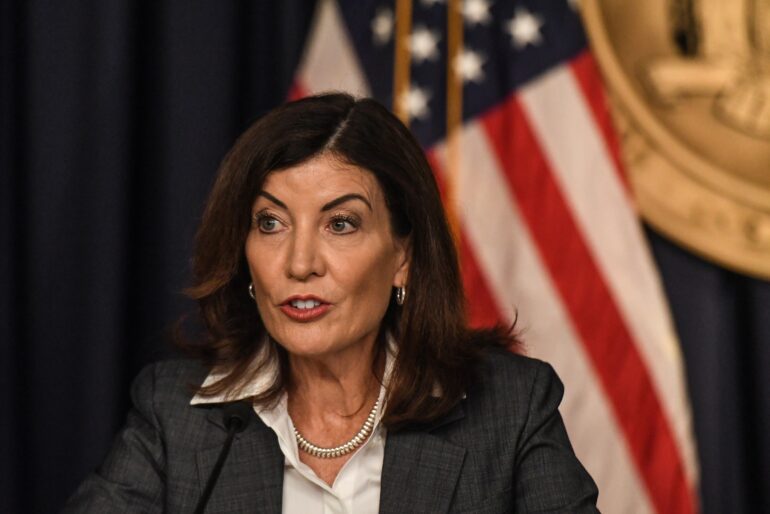TL;DR:
- Governor Hochul unveils the “Empire AI” plan, proposing a $275 million investment.
- The initiative seeks to establish a collaborative AI research consortium.
- Leading universities and private funders pledge support, including Columbia, Cornell, NYU, and Rensselaer.
- The project aims to create a high-tech research center in upstate New York.
- Focus on AI stands out among other state proposals.
- Challenges include data ownership issues and gaining legislative approval.
- Hochul’s economic strategy includes significant tech investments.
- Industry leaders endorse the initiative to bridge the gap between academia and tech.
- Concerns were raised about building a separate cloud infrastructure.
- Empire AI aims to stimulate innovation in various fields.
Main AI News:
In a bold move to position New York as a global leader in the artificial intelligence (AI) landscape, Governor Kathy Hochul has unveiled a groundbreaking proposal known as “Empire AI.” The initiative, outlined in her third State of the State address, aims to establish a first-of-its-kind statewide consortium that combines both public and private resources. The centerpiece of this visionary plan is the creation of a cutting-edge research center fueled by a substantial $275 million investment from the state.
Under this transformative initiative, Governor Hochul intends to foster collaboration between several prominent research institutions, including the State University of New York, the City University of New York, Columbia University, Cornell University, New York University, and Rensselaer Polytechnic Institute. Each of these academic powerhouses will contribute $25 million to the Empire AI project. Moreover, the initiative has secured significant private funding from influential figures like billionaire Thomas Secunda, co-founder of Bloomberg L.P., and the Simons Foundation, with its affiliated research center, the Flatiron Institute, also pledging support.
The crux of Empire AI lies in its commitment to providing a physical center in upstate New York, offering remote access to state-of-the-art computing power essential for modern AI software development. This visionary endeavor represents a departure from Governor Hochul’s other proposals, which primarily address issues like medical debt, literacy, and maternal mortality.
Governor Hochul envisions this investment as a critical step towards bridging the gap between technology companies and academic institutions in the race to advance AI. “This isn’t just a win for the future of tech—this is a win for the institutions across the state that will benefit from the growth of this technology,” she emphasized.
However, the venture into AI research comes at a time when the field faces newfound challenges. Legal disputes regarding access to data, including information from entities such as The New York Times, have raised pertinent questions about data ownership and utilization in AI research.
Governor Hochul faces the task of gaining approval from the state’s Democratic-controlled Legislature, which must consider the initiative against other pressing priorities, including a looming budget deficit. While some progressives advocate for taxing high earners, Governor Hochul has maintained her stance against increasing taxes, asserting that such a move could lead to the migration of wealthy individuals out of the state.
Governor Hochul’s economic strategy hinges on substantial investments, such as the $5.5 billion incentive package secured to bring Micron’s new facility to Syracuse. These investments aim to solidify New York’s position in the rapidly evolving technological landscape.
Notably, Empire AI enjoys support from prominent figures in the tech industry, with Sam Altman, CEO of OpenAI, commending the public-private partnership for the advancement of safe and beneficial AI technologies. Julie Samuels, President and Executive Director of Tech:NYC, representing major companies like Google, Microsoft, and Meta, believes the consortium will attract top talent from both academia and industry.
Tech giants like Microsoft and Google have historically held dominance in the AI field, owing to their access to costly computational resources and data. This advantage has lured researchers away from academia to the private sector, where they can command significantly higher salaries.
While Empire AI may not fully level the playing field between public and private sectors, it offers researchers access to previously unattainable tools and resources. This access could enable academics to address ethical questions that the industry may be less inclined to explore.
However, concerns have arisen about the state’s decision to create its cloud computing infrastructure rather than build upon existing platforms like Amazon or Google. Critics argue that this could be a logistically complex endeavor that raises security and reliability issues.
Governor Hochul’s team emphasizes that a primary objective of the Empire AI project is to challenge the monopoly held by tech giants in the AI field, fostering collaborative research in the public interest. Advocates anticipate that this partnership will enable AI technology to be applied to diverse fields of study, from urban planning to medicine and music, thereby driving innovation and addressing pressing global challenges.
Conclusion:
New York’s Empire AI initiative represents a significant leap in positioning the state as a global AI leader. The substantial investment, public-private collaboration, and commitment to cutting-edge research resources signal a promising future for AI innovation in New York. However, challenges related to data access and legislative approval will need to be addressed. This initiative has the potential to reshape the AI market, promoting collaboration and providing opportunities for academics and industry players to advance the field together.

